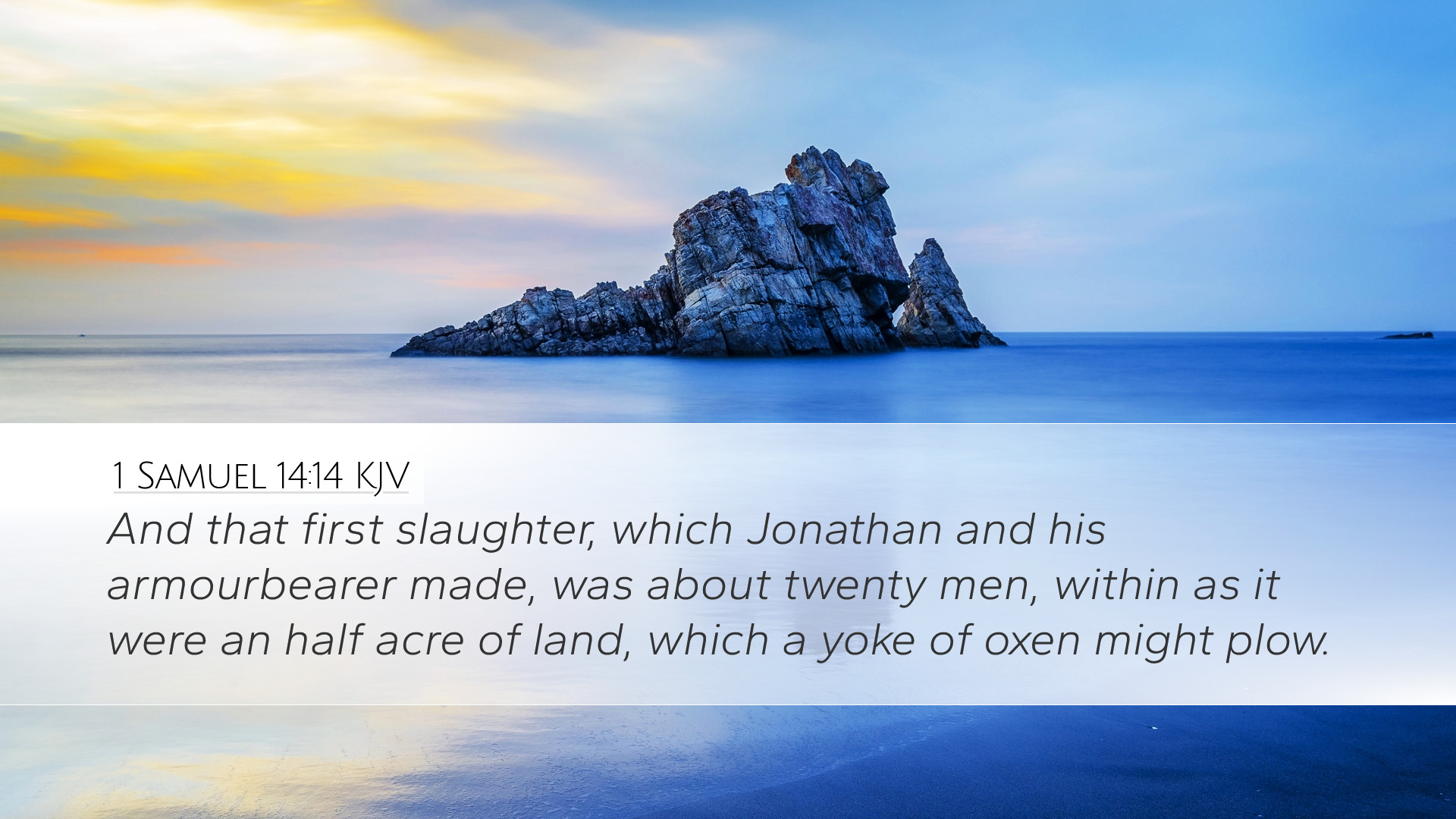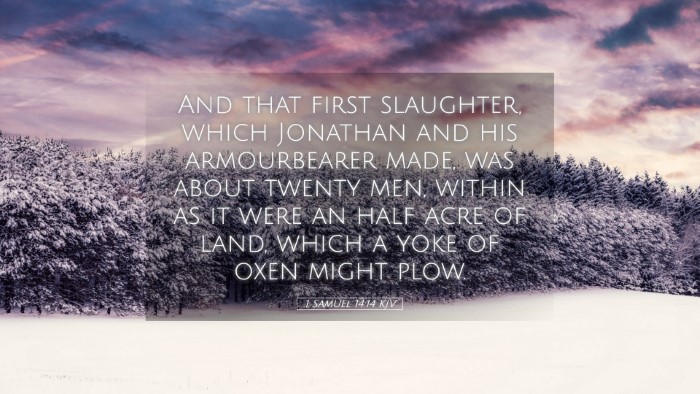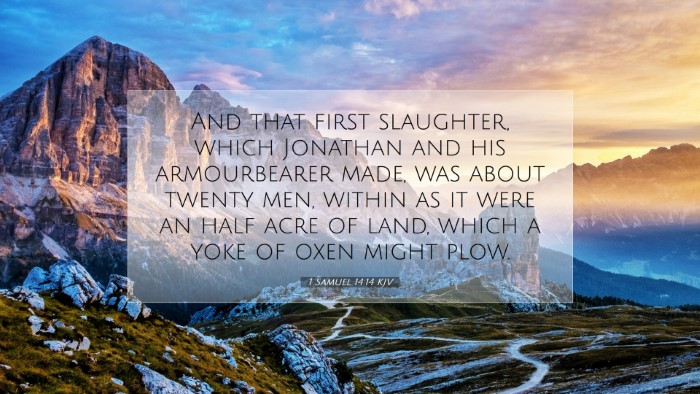Commentary on 1 Samuel 14:14
Verse Context: 1 Samuel 14:14 states, "And that first slaughter, which Jonathan and his armourbearer made, was about twenty men, within as it were an half acre of land, which a yoke of oxen might plow." This verse is pivotal in detailing a significant military event led by Jonathan, the son of King Saul, illustrating both the human agency involved in this battle and the divine hand that accompanied them.
Insights from Matthew Henry
Matthew Henry emphasizes the miraculous nature of Jonathan's victory, attributing it to the divine favor of God. He notes that the odds against Jonathan and his armor-bearer were tremendous, yet God intervened in their favor. Henry points out that Jonathan’s faith exemplifies the importance of reliance on God rather than mere numbers. He writes:
"It is a small thing with God to save by many or by few. Jonathan showed great zeal in the cause of God and his country, and though he was few in number, he acted with faith that moved God to deliver his people."
The Faith and Initiative of Jonathan
Henry stresses the initiative that Jonathan took before he engaged in battle. He does not wait for orders from his father, King Saul, but instead acts on a personal conviction. This act of faith is crucial for understanding the character of Jonathan. Henry remarks:
"His heart was not only set on the victory but also rooted in the conviction that the Lord could save Israel. He believed that God’s power is not limited by human constraints."
Insights from Albert Barnes
Albert Barnes provides a detailed analysis of the context and implications of Jonathan’s actions. He highlights that the "first slaughter" is significant not just for its immediate impact but for its broader implications on the morale of Israel.
The Tactical Genius of Jonathan
Barnes points out Jonathan's strategic approach, noting that he and his armor-bearer demonstrated courage and skill. The description of the area being "as it were an half acre of land" signifies a confined space, which underscores the audacity of their attack. Barnes elucidates:
"The provision that Jonathan and his armor-bearer made for a sudden attack in a limited area speaks to their understanding of battlefield strategy, wherein surprise and speed can defeat a larger foe.”
God’s Sovereignty in Military Affairs
Barnes also discusses the underlying theological message concerning God's sovereignty in military conflicts. This event serves as a reminder that God often uses the seemingly weak to accomplish His purposes. He writes:
"This victory illustrates the truth that God can use even a handful of men to achieve His plans — the battle belongs to the Lord."
Insights from Adam Clarke
Adam Clarke takes a broader historical perspective, integrating cultural and sociological factors affecting the narrative of 1 Samuel 14. He notes that the situation in Israel was dire, with the Philistines at a dominant position, which makes Jonathan’s act even more heroic.
Contrast Between Jonathan and Saul
Clarke draws a striking contrast between Jonathan and his father, King Saul. While Saul is depicted as hesitant, Jonathan displays an aggressive faith. Clarke highlights:
"While Saul remained in fear, paralyzed by the threats of the Philistines, Jonathan took decisive action. His example stands as a testament to the kind of leadership that trusts in God."
Historical Context and Its Relevance
Clarke points to the cultural norms of the time, suggesting that Jonathan’s willingness to fight reflects deeply on the values of bravery and faith over rank and privilege. He states:
"The narrative serves as a historical benchmark for the value of personal faith and action over the limitations of royal decree or social status."
Theological Themes
Collectively, the insights from these commentators allow for a rich exploration of the themes present in 1 Samuel 14:14:
- The Power of Faith: The narrative showcases that faith, even in a small group, can lead to significant outcomes when grounded in God’s promises.
- God’s Sovereignty: The victory attributed to Jonathan is a clear reminder that success in any endeavor is ultimately controlled by divine will.
- Leadership and Initiative: The contrast between Jonathan and Saul establishes a model for true leadership rooted in decisiveness and trust in God.
- Participation in God’s Plan: The actions of Jonathan motivate encouragement for believers to take initiative in their own faith journeys, trusting in God’s guidance.
Application for Modern Believers
The lessons derived from Jonathan's valiant act and the commentary offered by Henry, Barnes, and Clarke provide invaluable direction for modern believers:
- Courage in Adversity: Just as Jonathan faced overwhelming odds and chose to act, believers today are encouraged to take bold steps in faith, even when faced with seemingly insurmountable challenges.
- Trust in God's Control: In times of uncertainty, the reminder of God’s sovereignty is crucial; He fights our battles and orchestrates victories beyond human understanding.
- Model Leadership: The example of Jonathan encourages leaders to be proactive and to guide others not through fear but through inspiration that arises from faith.
- Engagement with God’s Mission: Each believer is invited to actively participate in God's work, trusting that their efforts, however small, contribute to the larger picture of His divine plan.
Conclusion
In summary, 1 Samuel 14:14 illustrates a critical moment in Israel's history, showcasing the intersection of faith, divine sovereignty, and courageous action. The reflections offered by Henry, Barnes, and Clarke encourage readers to delve deeper into their understanding of God’s work in their lives and inspire them to embrace challenges with faith and courage.


